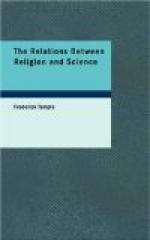Now stated in this abstract form this doctrine will be, and indeed if Science be admitted at all must be, accepted by everybody. Even the Roman Church, which holds that God is perpetually interfering with the course of nature, either in the interests of religious truth or out of loving kindness to His creatures, yet will acknowledge that the number of such interferences almost disappears in comparison of the countless millions of instances in which there is no reason to believe in any interference at all. And if we look at the universe as a whole, the general proposition as stated above is quite unaffected by the infinitesimal exception which is to be made by a believer in frequent miracles. But when this proposition is applied in detail it at once introduces the possibility of an entirely new history of the material universe. For this universe as we see it is almost entirely made up of composite and not of simple substances. We have been able to analyse all the substances that we know into a comparatively small number of simple elements—some usually solid, some liquid, some gaseous. But these simple elements are rarely found uncombined with others; most of those which we meet with in a pure state have been taken out of combination and reduced to simplicity by human agency. The various metals that we ordinarily use are mostly found in a state of ore, and we do not generally obtain them pure except by smelting. The air we breathe, though not a compound, is a mixture. The water which is essential to our life is a compound. And, if we pass from inorganic to organic substances, all vegetables and animals are compound, sustained by various articles of food which go to make up their frames. Now, how have these compounds been formed? It is quite possible that some of them, or all of them to some extent, may have been formed from the first. If Science could go back to the beginning of all things, which it obviously cannot, it might find the composition already accomplished, and be compelled to start with it as a given fact—a fact as incapable of scientific explanation as the existence of matter at all. But, on the other hand, composition and decomposition is a matter of every-day experience. Our very food could not nourish us except by passing through these processes in our bodies; and by the same processes we prepare much of our food before consuming it. May not Science go back to the time when these processes had not yet begun? May not the starting-point of the history of the universe be a condition in which the simple elements were still uncombined? If Science could go back to the beginning of all things, might we not find all the elements of material things ready indeed for the action of the inherent forces which would presently unite them in an infinite variety of combinations, but as yet still separate from each other? Scattered through enormous regions of space, but drawn together by the force of gravitation; their original heat, whatever it may have been, increased




